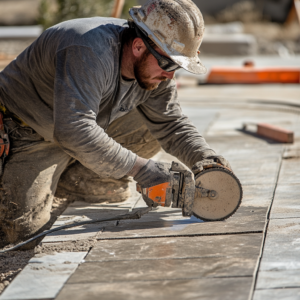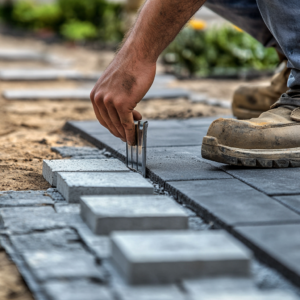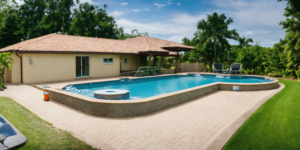If you’re trying to choose the right sealer for your concrete paver patios, or other concrete application, we know exactly what you’re going through. Between water-based vs. solvent-based sealers, there are so many choices you’re probably going crazy if there’s no one to help.
A simple thing like sealing your pavers can become overly complicated when you need to decide not just if you want a wet look or not, but also deciding between these two options. This decision will impact how long the sealing layer will last, how wet your sealers will look, how strong the smell of chemicals will be in the first few days, and ultimately the surrounding environment.
Luckily, we’re here for you. We’ve been where you are – in fact, we are there every week as we help our clients make the right choice. So today we’ll guide you in doing the same!
Read also: How much do pavers cost in Florida? A 2024 guide
Jump to:
Water-based vs. solvent-based sealers
The first step in order to properly understand the difference between water-based vs. solvent-based sealers is knowing what each sealer product can provide and one’s expectations – and making sure both are well suited for each other.
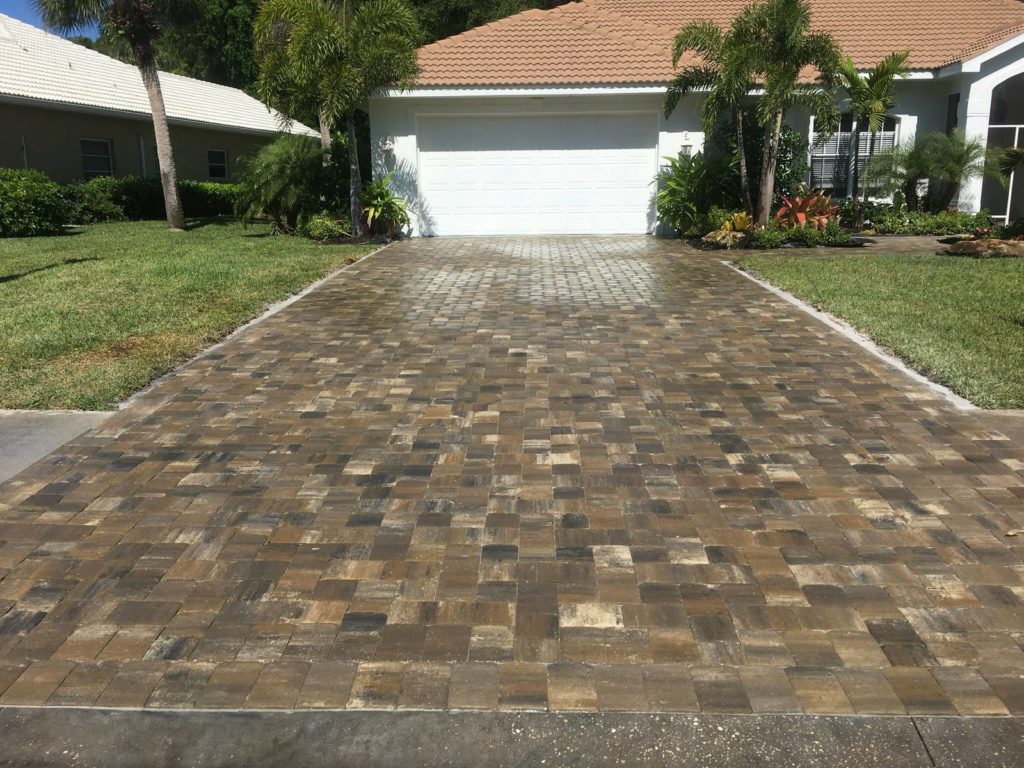
Let’s start by establishing that both water-based and solvent-based sealers are film-forming sealers.
What makes them similar is that both aim at creating a chemical layer on top of your concrete pavers’ surface that will protect them from absorbing liquids, acids, and staining in general. Both of them also add to aesthetics providing some kind of color enhancement while also protecting from UV rays that can cause discoloration.
The difference lies in how they form this film which is made of acrylic polymers.
How water-based sealers work
In water-based sealers, the polymer particles are dispersed in water, forming an emulsion, meaning that the polymer particles don’t bond to the water particles. After the sealer is applied to the pavers, the water will naturally evaporate and the polymer particles will start to move closer together until they actually fuse and form a clear coating.
How solvent-based sealers work
In solvent-based sealers, the polymers particles are not dispersed, instead, they form a clear solution. After application, when the solvent evaporates, the already existent polymer chains are drawn even closer together, also forming a clear coating.
Read also: How to re-sand pavers and make your patio look new again
Differences between water-based vs. solvent-based sealers
In the past, since the polymers were already close together on solvent-based sealers, they were normally capable to form stronger layers, and water-based sealers were left as a less desirable option.
However, the chemicals necessary to solve polymers are very strong – with a high rate of VOC (volatile organic compound) – and those have been subjected to restrictive environmental regulations. This led to two things: higher investment in creating high-performance water-based sealers (lower VOC), and solvent-based sealers which were forced to be less strong (still higher VOC).
This all means nowadays the differences in performance between water-based vs. solvent-based sealers are not very perceptible. However, some differences remain. Let’s get into it.
| Water-Based | Solvent-Based | |
| VOC’s | Low (Sometimes nothing) | High |
| Color Modification (Wet Look) | Will not darken the surface much | Will significantly darken the surface much |
| Resistance to emulsification | Will not re-emulsify in water or oil once cured | Will re-emulsify in oil and other solvents |
| Film Thickness | Thin, but tenacious film | Thick film |
| Adhesion | Penetrates deep into the surface. Will not blister, peel, or delaminate. | Sticks to the outer surface. Overtime may blister, peel, or delaminate. |
| Toxicity | Non-toxic | Toxic |
| Finishes | Natural, Satin & Low Gloss | High Gloss |
| Duration | 3–5 years | 2–5 years |
| Better for | Chemical Protection | Color Enhancement |
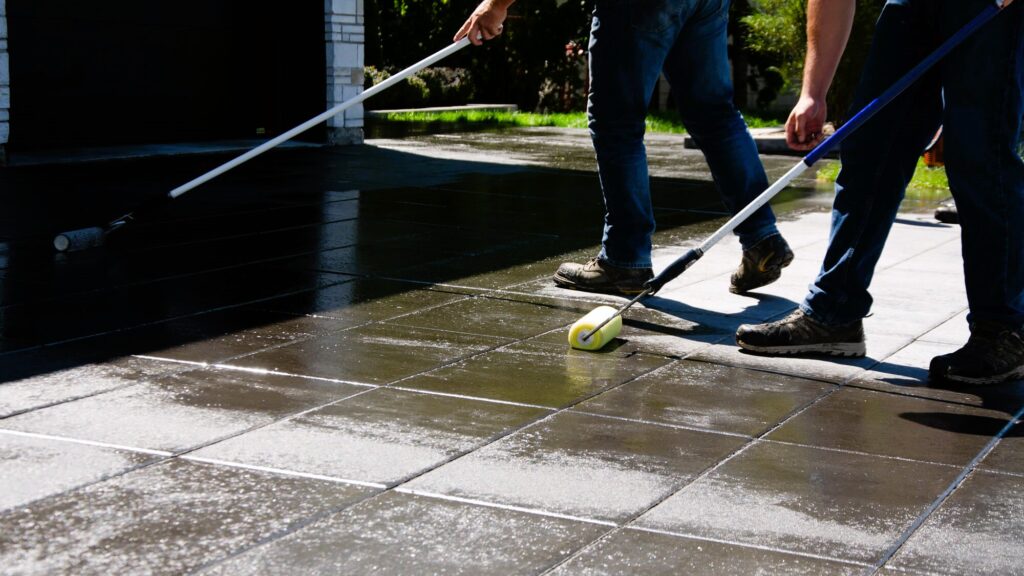
Water-based vs. solvent-based sealers: special notes
Appearance can never be overlooked when talking about water-based vs. solvent-based sealers. This is actually the main difference.
Solvent-based sealers can create a glossier finish and reach that super-wet look many homeowners crave. Water-based sealers, on the other hand, will create a lower gloss finish, or even a natural one if that’s desired.
Durability is another important factor. Nowadays, it seems that water-based sealers are able to resist better to chemicals and physical wear. However, keep in mind that’s a feature in constant development, which will greatly vary from one brand to the other.
Getting advice from experienced contractors who work with sealers every other day is a way to figure out which brand has been performing better.
As for handling, this is the main area where water-based sealers excel. They are not flammable, have no strong odor, and allow for a quicker and easier installation and clean-up.
Read also: What is the cheapest time of year to pave a driveway?
Water-based vs. solvent-based sealers: pros and cons
Solvent-Based Pros
- Capable of penetrating deeply into dense and polished surfaces.
- Enhances surfaces with solvents and boosters.
- Achieves a higher gloss finish, especially with epoxy and polyurethane coatings.
Solvent-Based Cons
- Typically more costly due to the price of solvents and additional transportation expenses.
- Quick evaporation in warm weather makes application challenging in hot climates.
- Requires completely dry surfaces, making it difficult to apply in humid or wet conditions.
- Strong odors make it hard to use in enclosed spaces.
- Necessitates the use of additional personal protective equipment (PPE).
Water-Based Pros
- Suitable for a wide range of surfaces from very porous to very dense.
- Safer for indoor and outdoor use, including around children and pets.
- Non-hazardous, non-flammable, low VOC, and generally odorless.
- Can be applied in warmer, humid, and wet conditions without needing a fully dry surface.
- Versatile for both indoor and outdoor applications.
- More cost-effective.
- Easy to clean tools with water, allowing for reuse and less waste.
Water-Based Cons
- May not achieve the same high gloss as solvent-based epoxy and polyurethane.
- Might not penetrate as deeply into very dense and polished surfaces.
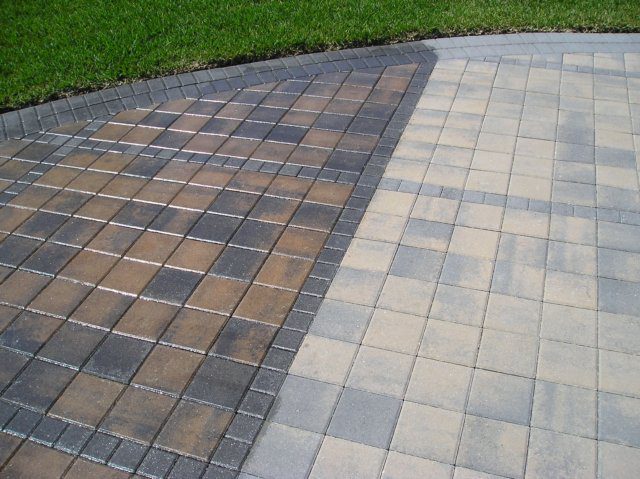
Find a contractor you can trust!
Although it is not impossible to seal your pavers all by yourself, it’s not recommended. You see, doing it the right way will be a tough job that requires some special tools and equipment you probably don’t have at home.
If you live in Florida and are looking for a reputable contractor, you can trust our expert team to do it for you with no time and no mess. Call us at any time for a free estimate!

